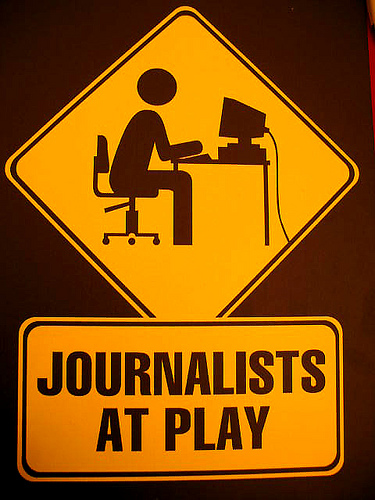In today’s age of instant breaking news one has to begin to begin to question if we’re losing some of the journalistic integrity that the general public typically expects from the news media. The Society of Professional Journalists’ Code of Ethics states:
“Conscientious journalists from all media and specialties strive to serve the public with thoroughness and honesty. Professional integrity is the cornerstone of a journalist’s credibility. Members of the Society share a dedication to ethical behavior and adopt this code to declare the Society’s principles and standards of practice.”
In addition, the American Society of Newspaper Editors (founded in 1922) developed their “Canons of Journalism”, their version of a code of ethics. Though not as official as an “oath”, their outline does convey the need for journalistic integrity on the part of editors and journalists alike.
- Responsibility (of newspaper and journalist)
- Freedom of the Press (“a vital right of mankind”)
- Independence (fidelity to the public interest)
- Sincerity, Truthfulness, Accuracy (good faith with reader)
- Impartiality (news reports free from opinion or bias)
- Fair Play, Decency (recognition of private rights, prompt correction of errors)
Testing Journalism
Unfortunately, recent instances have tested journalists and editors and their allegiance to journalist integrity in the race to break news quickly and/or present a comprehensive tell-all story to the public.
I don’t usually talk about sports in my blog posts, but the recent hype over Peyton Manning and his possible retirement vs. departure from the Colts sparked a frenzy over multiple social media channels — yet none quite like Twitter thanks to actor Rob Lowe.
Rob Lowe, a personal friend of Indianapolis Colts owner Jim Irsay, claimed that Peyton Manning was not going to return to the NFL instantly igniting a firestorm of speculation on Twitter that Manning was incapable of returning to active status after repeated neck surgeries. Multiple news sources jumped on the story except for one of the largest, ESPN. Later, ESPN columnist Chris Jones explained in an ESPN The Magazine column why the decision was made not to run with the story. The bottom line: “we support the highest standards of journalistic integrity and transparency.”
A second example didn’t begin on social media like the Rob Lowe story, however the reverberations were felt throughout the social media universe. Public Radio International’s This American Life television program was forced to issue an unprecedented retraction when it realized it had broadcast a piece on Foxconn, an iPhone and iPad manufacturer, that it had failed to vet properly. By failing to vet the piece, Public Radio International missed the fact that Mike Daisey, the monologist in charge of the report, made significant fabrications in his piece. This American Life host and producer Ira Glass stated,” “We’re horrified to have let something like this onto public radio.”
The unfortunate reality is we’re likely to see more of these problems occur as we move forward instead of less. As people rush to get news onto the air and out to the social media universe, they seem less likely to check their sources and provide their readers with reputable news, opting instead for quick and easy. The question is, how long will it be before the public tires of simply fast and instead wants fast and reliable?
Related articles
- Attacking the press (economist.com)
- Why You Should Stop Trusting Twitter (jasonschreier.com)
- This American Life’s Apple Retraction: The Danger of Truthiness (time.com)




